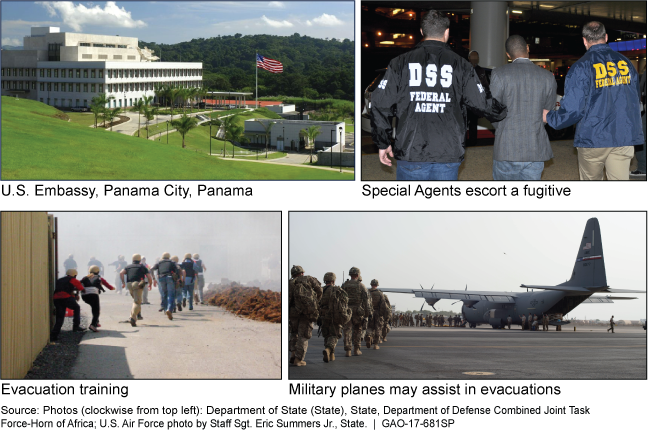Diplomatic Security: Key Oversight Issues
Fast Facts
Terrorist attacks against U.S. diplomats and personnel overseas have underscored the need to protect U.S. people, property, and information. The State Department has taken steps to improve diplomatic security, such as building more secure embassies and requiring counter threat training for personnel.
We identified 11 key diplomatic security issues for congressional oversight—highlighting numerous challenges from our prior reports. For example, we found many diplomatic residences that didn't meet security standards. As of August 14, 2017, 24 of our 27 open priority recommendations for State are related to diplomatic security.
Diplomatic Security in Action

4 photos of diplomatic security: an embassy, agents at work, evacuation drills, and a military plane
Highlights
What GAO Found
In response to increasing threats to U.S. personnel and facilities at overseas diplomatic posts since 1998, the Department of State (State) has taken a number of steps to enhance its risk management and security efforts. State's Bureau of Diplomatic Security (Diplomatic Security) leads many of these efforts with assistance from other bureaus and U.S. government agencies. Given the ongoing threats and the amount of resources needed to counter them, GAO has identified 11 key issues regarding Diplomatic Security that warrant significant Congressional oversight to monitor the cost, progress, and impact:
- Diplomatic Security Funding: Diplomatic Security funding has increased considerably in reaction to a number of security incidents overseas and domestically. In fiscal year 2016, total funding for Diplomatic Security operations--which includes its bureau managed funds as well as other funding such as personnel salaries--was almost $4.8 billion.
- Diplomatic Security Staffing Challenges: Diplomatic Security's workforce--including 3,488 direct-hire, 1,989 other U.S. government, and 45,870 contract personnel--continues to grow. However, potential challenges exist regarding the distribution of domestic and overseas positions, posting fully qualified individuals in the assignments with the greatest needs, and ongoing efforts to fill language-designated positions.
- Physical Security of U.S. Diplomatic Facilities: Diplomatic Security and the Bureau of Overseas Buildings Operations collaborate to meet safety standards when constructing new embassies and mitigating risks at existing facilities. However, GAO made recommendations to address gaps in State's security related activities and processes.
- Physical Security of Diplomatic Residences and Other Soft Targets: State has taken steps to address residential security vulnerabilities and manage risks at schools and other soft targets overseas. However, GAO recommended actions to address weaknesses in State's efforts.
- Security Training Compliance: While State has robust security training requirements, it lacks consistent monitoring and enforcement processes, particularly for its Foreign Affairs Counter Threat training and for security refresher briefings at posts.
- Embassy Crisis and Evacuation Preparedness: Gaps in State's implementation and monitoring of crisis and evacuation preparedness could endanger staff assigned to overseas posts and the family members accompanying them. GAO has recommended actions to address these issues.
- Department of Defense (DOD) Support to U.S. Diplomatic Missions: Following the Benghazi attacks, DOD increased its support to U.S. diplomatic missions by creating dedicated military forces to respond to crises and expanding the Marine Security Guard program at overseas missions. However, State and DOD reported that they have experienced some logistical and other challenges.
- Dissemination of Threat Information: State has processes for communicating threat information to post personnel and U.S. citizens in-country. However, post personnel--including locally employed staff--have not always received important information in a timely manner. GAO has recommended steps State needs to take to address this concern.
- Countering Human Intelligence Threats: Foreign intelligence entities from host nations and third parties are motivated to collect information on U.S. operations and intentions. State has established measures to counter the human intelligence threat and works with other U.S. government agencies to identify and assess this threat.
- Ensuring Information Security: GAO has designated federal information security as a government-wide high-risk area and made recommendations to address these issues. State faces evolving threats and challenges to maintaining obsolete technology, defining clear roles and responsibilities for information security, and overseeing technology contractors.
- Status of Recommendations Made in Reports following the Benghazi Attack: In response to the Benghazi attack, State formed interagency teams to evaluate the security at 19 dangerous posts, convened an Accountability Review Board (ARB) to investigate the attack, and established panels to conduct further assessments. As of June 2017, State reported having addressed recommendations as follows: 268 of 287 made by the interagency teams, 26 of 29 by the ARB, and 64 of 75 by the panels.
Why GAO Did This Study
Terrorist attacks against U.S. diplomats and personnel overseas have led to increased attention of State's diplomatic security efforts. In this special publication, GAO identifies key issues affecting Diplomatic Security for Congressional oversight. These issues were identified from a body of related GAO work and State and other reports. GAO also interviewed U.S. officials from State and other agencies to obtain their views on key issues, obtain updated information and data, and follow up on actions they have taken on past GAO and other oversight report recommendations.
Recommendations
While State has taken steps to close recommendations made in past GAO reports, GAO identified 27 open recommendations from these reports (as of August 2017) that it believes should be given high priority for implementation. Of the 27 priority recommendations, 24 were related to diplomatic security.
